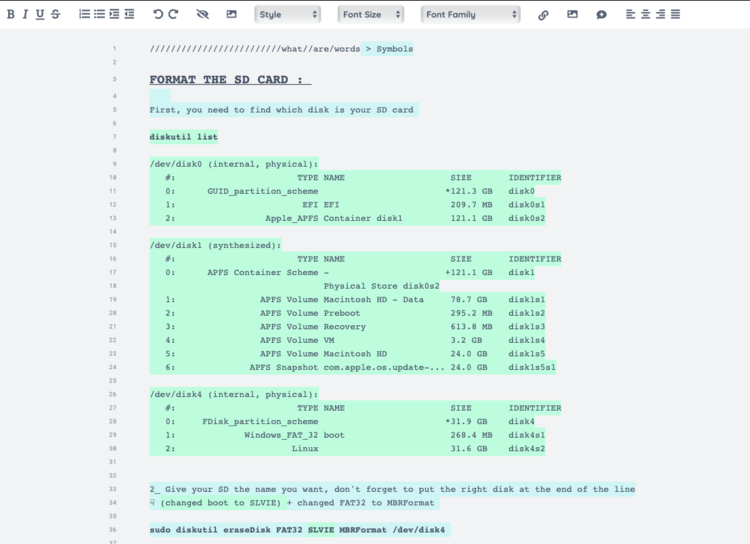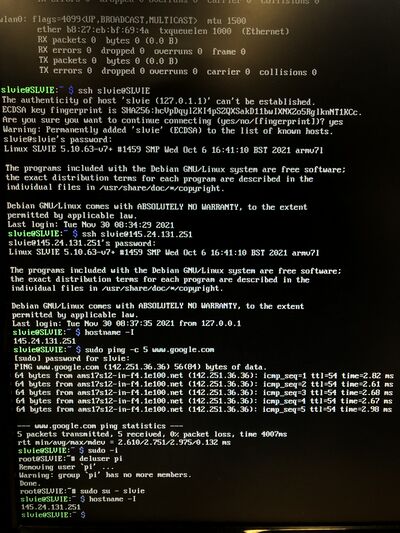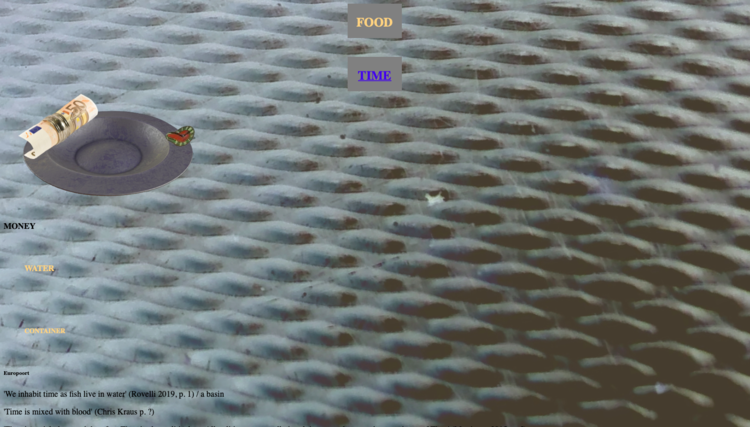User:Trashpuppy/GRAD: Difference between revisions
Trashpuppy (talk | contribs) No edit summary |
Trashpuppy (talk | contribs) |
||
| Line 3: | Line 3: | ||
===<p><p style="color:black; font-family: Alike Angular; font-size: 20pt; font-weight: bold;">How do you plan to make it?</p>=== | ===<p><p style="color:black; font-family: Alike Angular; font-size: 20pt; font-weight: bold;">How do you plan to make it?</p>=== | ||
=<p><p style="color:black; font-family: Alike Angular; font-size: 20pt; font-weight: bold;">Project proposal</p>= | =<p><p style="color:black; font-family: Alike Angular; font-size: 20pt; font-weight: bold;">Project proposal 1</p>= | ||
<p style="color:black; font-family: Alike Angular; font-size: 20pt; font-weight: bold;"><b>Working title: A Sea of Thought</b> | <p style="color:black; font-family: Alike Angular; font-size: 20pt; font-weight: bold;"><b>Working title: A Sea of Thought</b> | ||
Revision as of 15:50, 26 April 2022
Project proposal2
Intent and Content
How do you plan to make it?
Project proposal 1
Working title: A Sea of Thought
Intent and Content
I will create a website, a digital environment that functions as an infrastructure to share, activate and map out my research on the relationship of the Netherlands to water and the (built) environment. This takes the form of a poetic inquiry that takes various locations and events as points of departure. This project will be long term. For this year, I aim to build the skeleton of the website and a first utterance of content related to the following locations:
Rotta: The Deluge and the Dutch origin myth
Delfshaven: The Moon and the Market
Europort: Liquid land
NorthC (Datacenter): Clouded vision
The poetic inquiry consists of two aspects that in large provide the content for the website; the thesis and radio show Dear Navigator. The listed locations are at the heart of the thesis framework. For a further elaboration on the significance of these location I refer you to the thesis outline.‘Dear Navigator’ is a radio show in collaboration with Cara Mayer Yepez and Good Times Bad Times Radio. With each episode we focus on a different physical location in Rotterdam, weaving together field-recordings, music, spoken word and discussions, to give rise to a sonic collage that speaks of memory, architecture, and political realities. We are currently developing the second episode on the Tweebosbuurt and Zalmhaventoren. The first episode focusses on the Maastunnel. The development of each episode takes about 1 or 2 months. Two of the episodes we will be developing over the course of this year focus on Delfshaven and the Europort.
The thesis and ‘Dear Navigator’ are both informed by a collage structure. This will hold for the digital environment I propose to build. The website will mix, hyperlink, content from different sources. Both showing, making available own research as well as the sources accessed in carrying out the research.
• Writing: speculative fiction as well as essayistic writing.
• Imagery:
o Archival material accessed through Het Nieuwe Instituut, the Rotterdam City archive. I would also be interested to explore different archival collections but retaining a Dutch connection.
o Self-created imagery:
footage shot on location, collages mixing archive materials such as for example old Dutch paintings, archaeological findings from the sites, images shot on location and stock images. These collages, because of being digital, can be hyperlinked or hover triggered.
• Sound:
o Dear Navigator episodes Europort and Delfshaven
o Self-made recordings: poetic sound-performances, based on the research and field-recordings from the beforementioned locations.
o Samples from music and research material
STRUCTURE:
• Wiki structure
• Hosted on a Rasberry Pi.
How do you plan to make it?
For realizing the technical aspects of the website, I will make use of tools introduced to me by the Parallel Library Services Workshophosted by Simon Brown at Varia. This workshop series I am partaking in, familiarizing digital tools for setting up a library, archive and (collaborative) annotation practices. This workshop spans till March.
November till April I will spend time researching for my thesis, ‘Dear Navigator’ and related topics. This will go hand in hand with collecting, collating, creating material for the sonic, written, and visual material of the website. This data-base I am collecting over time, will feed the website. Another red thread throughout most months will be developing, refining HTML and CSS skills.
•November, December
[✓] Visit exhibition V2 Reasonable Doubt
[✓] Set up RPi server
[✓]Set-up Media wiki on RPi
[]Visit NorthC data center
[✓]Learn how to connect RPi to different network
[✓]Dear Navigator Special: A Tribute to the Tweebosbuurt
•January
[✓] 1-Week residency with Adele in Brussels. Our outset is to produce a publication on technological landscapes, blending drawings, collages, and essayistic speculative fiction. This publication will generate possible content for the website. Data collected from the visit to the Data centre will form the outset for our residency.
[]Continue learning the basics of the mediaWiki infrastructure.
[]Follow lecture Hydrofeminism
[]Create 'Dear Navigator' Episode 2: De(con)struction
~ ~ ~ ~ ~ ~ ~ ~ ~ ~ ~ Intermediate outcome: self-hosted set up (RPi) and first gathered content: Delfshaven and NorthC (publication Adele)
• February
[]Visit exhibition “No Linear Fucking Timing” at BAK
[]Processing the research: start coding research into the website (if not done simultaneously to the conducting research)
[]Create ‘Dear Navigator’ Episode 3: Fracking in Rotterdam South
[]2ndWeek residency with Adele in Brussels --> Meeting w Constant & Marjolijn Dijkstra ?
• March
[]Start playing around with Javascript to explore the interactive options of the website
especially with regards to including audio. For example, ScrollMagic.
[]Development Dear Navigator Episode 4: Delfshaven?
[]Coding research into the website.
• April
[]Coding research into the website.
[]3rdWeek residency with Adele in Brussels
• May
[] Continue working on the content of the website
[] Explore options for CSS/HTML to Print (randomised)
[] Learn how to broadcast
• June
[]The website online through router port forwarding
[]Refine and finish the website
[]4thWeek residency with Adele in Brussels
[]Build antenna
• ?? GRAD show preparation
[]Learn how to build an antenna
[]Learn how to broadcast using Icecast and pi-box
[]Come up with a program - Could we do a live Dear Navigator broadcasting?
D®ive
My motivation for this project has a lot to do with the fact that I wish history in general, but Dutch history specifically, would have been addressed quite differently in school. The past informs the present. To uncover and critically assess this past I think is highly important as time is cyclical and historical patterns repeat themselves. The society we live in today is still very much formed on the same fundaments as 500 years ago. Nothing disappears, things only change shape.
The aspect of hyperlinking is important to me, as a way of organizing thought as well as sharing the employed research sources and tools. Additionally, it helps to connecting the stories of one place to that of another. While there are different forces at play in different places, some of the structures we find ourselves in are rather collective, global. Cross-referencing and looking for parallels for this reason can be very fruitful ground.
Why using the internet? Water and the internet are inextricably linked to one another. How the internet traces the sea floor, following the slave trade routes and old telegram lines, is rooted in memory. This is development and heritage, is at the core of some of the topics discussed on the website. I want to use the internet as a tool to reflect on this tension.
Comrades for collaborating and communicating
The people from the Parallel Library Services can help me to figure out which digital tools exactly would work best to carry out this project. The interaction station / (digital) publication lab will be able to provide me with the necessary support to get the Rasberry Pi up and running as well as other technical questions with regards to coding.
I will be contacting OSP to help me out with some specific questions about the open-source code they provide.
Additionally, I will consult some people from XPUB for advice and small demonstrations if necessary.
With regards to the writing of the thesis, my friends as well as Natasha will be valuable in discussing, reflecting and perfecting.
Relation to previous practice
As mentioned before, this project draws heavily on Dear Navigator that as a project aims to uncover and recover stories about places in Rotterdam.
Last year, I focussed a lot on construction sites. I thought these places gave a glimpse of the city in motion. Uncovering the city as a palimpsest, a result of a constant process of writing and re- writing. While writing is erased, overwritten, or forgotten, it never really disappears. Over time different memories compete to come back to the surface. Where does a place start and where does it end? It stretches beyond merely the visible. This concept of the city as a palimpsest still very much underlies what I am doing with this project. Making the past writings (more) legible. This project in a way would function as a speculative recording device, for is writing history ever anything else?
Additionally, this comes to the fore in the collages I have been constructing from a mixture of stock images, self-recorded footage and archive material. These collages show a plurality of temporalities through making use of these different source materials: the past informs the present.
Prototyping
RPi selfhosting set-up
CSS HTML try outs
First two tryouts of creating pages with HTML and CSS
Technical cookbook
- https://homebrewserver.club/fundamentals-port-forwarding.html
- http://eth.leverburns.blue/p/clax&Syl___-rpi Documentation RPi set-up
- https://pad.simonbrowne.biz/p/dearnavigator
- http://osp.kitchen/tools/ethertoff/#project-detail-readme Etheroff: wiki consisting of Pads
- http://osp.kitchen/tools/mediawiki.skin.ustensile/
- http://osp.kitchen/tools/html2print/
- https://pzwiki.wdka.nl/mediadesign/Weasyprint
- https://www.mediawiki.org/wiki/Manual:Installation_guide
- https://p-node.org/documentation/pibox/what-is-a-pibox How to build your own radio with pi-box
- https://p-node.org/documentation/pibox/pibox_antenna How to build your own antenna
- https://hackersanddesigners.nl/s/Tools
Video sources
- Cole, T. (2012) The City as Palimpsest
- REZAIRE, T. (2017). DEEP DOWN TIDAL
- How Doggerland Sank Beneath The Waves (500,000-4000 BC) // Prehistoric Europe Documentary
https://www.youtube.com/watch?v=DECwfQQqRzo&t=1390s
Book sources
- Fox, D. (2019). Limbo. Fitzcarraldo Editions.
- Coghlan, J.M. (2020). The Cambridge companion to literature and food. Chapter 11: Postcolonial Tastes. Cambridge Cambridge University Press.
- Geuze, A. & Koekebakker, O. (2005). The Flood : 2nd International Architecture Biennale Rotterdam ; catalogue ; [26 mei - 26 juni 2005]. Rotterdam: Internationale Architectuur Biënnale.
- Klose, A. (2016). Container Principle. Cambridge, Massachusetts: The Mit Press.
- Sekula, A., Buchloh, B.H.D. and Kunsthalle Bielefeld (1995). Allan Sekula : fish story. Düsseldorf: Richter.
- Sparkly Kat, A. (2021). Post-colonial Astrology.
- THE FUNAMBULIST MAGAZINE. (2017). Students: Shipping Tales. [online] Available at: https://thefunambulist.net/magazine/09-islands/students-shipping-tales-christina- varvia [Accessed 3 Nov. 2021].
- Lanchester, J. (2021). Gargantuanisation. [online] London Review of Books. Available at: https://www.lrb.co.uk/the-paper/v43/n08/john-lanchester/gargantuanisation [Accessed 15 Nov. 2021].
- Taiwo, O. (2021). Our Planet Is Heating Up. Why Are Climate Politics Still Frozen? [online] The New Yorker. Available at: https://www.newyorker.com/magazine/2021/11/01/our-planet-is- heating-up-why-are-climate-politics-still-frozen-colonialism-environment [Accessed 4 Nov. 2021].
A potential program
Through a (regional) political program you drawn an image up of what a city, a place can be like. Conjure up a utopia. Is it still possible to imagine a utopia?
The myth of the ark, the last vessel on Earth, its presence in popular science fiction and populist nationalist fortifications, is telling. We do not seem to get beyond this imaginary characterised by a dispossession: disproportionate distribution of power. Utopia and dystopia are equally attainable. It is political to imagine a more optimistic future.
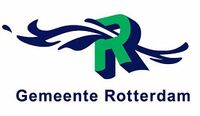
Migration
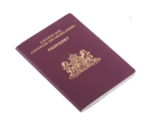
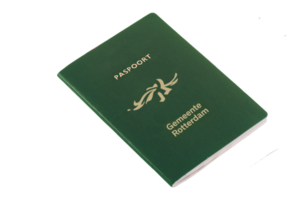
BIJ1’s political program for the regional elections of 2022, includes the proposition to convert Rotterdam into a ‘sanctuary city’ harbouring undocumented people through supplying a so-called city passport, which grants rights and possibilities similar to those of Rotterdam’s citizens (Programmacommissie Rotterdam BIJ1, 2022). Making it increasingly difficult for Dutch immigration authorities to evict those not in possession of asylum. This should also include equal voting rights. Regional elections now only allow registered EU people to vote; registered non-EU people become eligible to vote only after 5 years. All those subject to the laws of a territory should be able to participate, have a say in their imposition.
Naar schatting wonen volgens de Pauluskerk zo’n 10.000 mensen zonder verblijfsvergunning in Rotterdam (Sneep, 2022 )
Housing

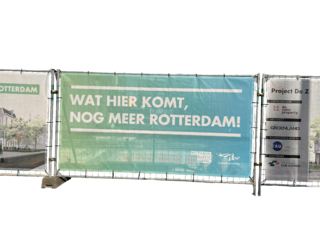
Climate and Sustainability
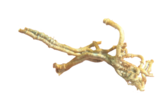
Economic Justice
Democracy and control
The de-colonial city
This one makes me think of the broken down statue of for example Piet Heijn in Delfshaven
Culture
Education
Care
Security
Digitisation
References
- Sneep, W. (2022). Rotterdam behandelt ongedocumenteerden strenger dan andere steden [€]. [online] Vers Beton. Available at: https://www.versbeton.nl/2022/04/rotterdam-behandelt-ongedocumenteerden-strenger-dan-andere-steden/ [Accessed 25 Apr. 2022].

